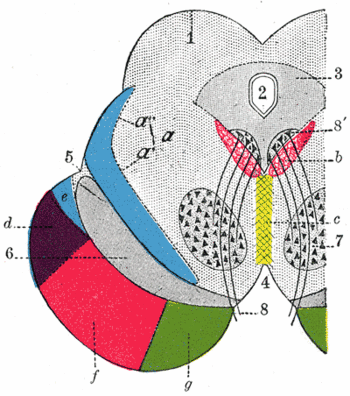Decorticate rigidity: Difference between revisions
imported>Howard C. Berkowitz No edit summary |
mNo edit summary |
||
| Line 11: | Line 11: | ||
==References== | ==References== | ||
<references/> | <references/>[[Category:Suggestion Bot Tag]] | ||
Latest revision as of 11:01, 5 August 2024
In neurological physical examination, decorticate rigidity is "characterized by flexion of the elbows and wrists with extension of the legs and feet. The causative lesion for this condition is located above the red nuclei and usually consists of diffuse cerebral damage."[1][2]
Decorticate rigidity reduced the motor score of the Glasgow Coma Scale to 3 points.
Decerebrate rigidity is similar except the upper extremities are extended, the lesion is below the red nucleus, and the motor score of the Glasgow Coma Scale to 2 points.
Brain concussions occasionally include tonic posturing lasting 2 to 30 seconds with "abduction and elevation of semiflexed arms and shoulders in a 'bear-hug' posture".[3] Decorticate posturing may occur during hypotension of syncope.[4]
References
- ↑ Anonymous (2024), Decorticate rigidity (English). Medical Subject Headings. U.S. National Library of Medicine.
- ↑ Ropper, Allan H.; Adams, Raymond Delacy; Victor, Maurice (1997). Principles of Neurology (in English), 6th. New York: McGraw-Hill, Health Professions Division, 358. ISBN 0-07-067439-6.
- ↑ McCrory PR, Berkovic SF (April 2000). "Video analysis of acute motor and convulsive manifestations in sport-related concussion". Neurology 54 (7): 1488–91. PMID 10751264. [e]
- ↑ Passman R, Horvath G, Thomas J, et al (September 2003). "Clinical spectrum and prevalence of neurologic events provoked by tilt table testing". Arch. Intern. Med. 163 (16): 1945–8. DOI:10.1001/archinte.163.16.1945. PMID 12963568. Research Blogging.
